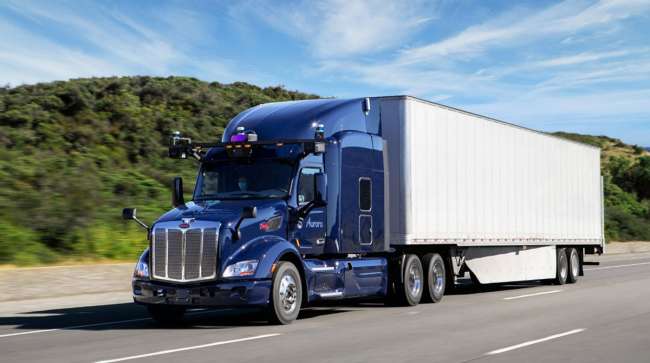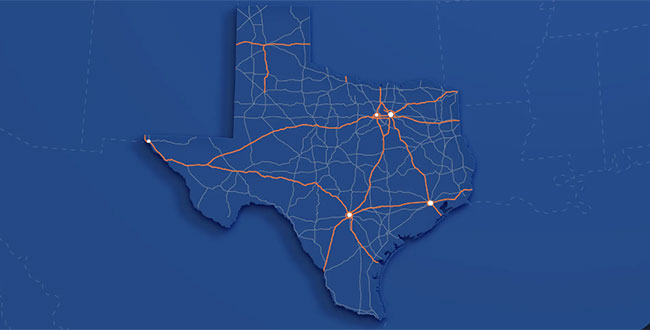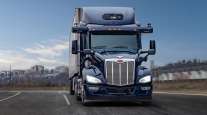Contributing Writer
Aurora Expands Autonomous Trucking Tests in Texas

[Stay on top of transportation news: Get TTNews in your inbox.]
Autonomous vehicle technology developer Aurora Innovation Inc. said it plans to expand testing throughout Texas as it works toward commercializing self-driving trucks.
In a May 27 blog post, the company said that it is expanding its relationships with shippers and motor carriers as it works to refine its autonomous Aurora Driver technology to fit their needs and handle highway traffic.
To safely deploy a self-driving truck that can handle the complexities of highway driving, Aurora is developing and refining key capabilities such as complicated lane changes and merges, and entering and exiting the freeway. The goal is to create an autonomous freight system that is “safer, faster, more reliable and more efficient,” the company said.
Take a closer look at how we're preparing the Aurora Driver to move goods for key logistics companies on middle-mile routes in Texas https://t.co/FlvnmBNaCN — Aurora (@aurora_inno) May 27, 2021
Aurora said it takes about three days to deliver goods from Dallas to Los Angeles with humans at the wheel. But when trucks operating with its Aurora Driver technology are fully deployed, it said the 1,500-mile trip will take less than 24 hours.
“Our first commercial pilots will move goods for shippers and carriers on several key middle-mile routes in Texas, which moves more freight by trucks than any other state,” the company said.
In the company’s hub-to-hub service, a human driver would take a loaded trailer from a warehouse to a transfer hub. An autonomous truck would then haul it to a second transfer hub, where the trailer would be manually driven to its final destination.
For now, Aurora’s early tests in Texas primarily involve moving snack foods for customers.
“When we open up our commercial pilots over the summer with shippers and carriers, we will be moving many more types of goods,” the company told Transport Topics.

Aurora's testing route through Texas. (Aurora)
The Mountain View, Calif.-based company also is ramping up production of high-definition maps for its self-driving system. Digital maps are considered a key component of autonomous drivers because they provide essential information about roads and intersections.
“Our strong mapping foundation in Texas helps us rapidly and seamlessly add routes as we improve our technology and expand services throughout the Southwest corridor,” the company said.
Aurora has partnered with both Volvo Group and Paccar to commercialize autonomous Class 8 trucks in North America. It is using Peterbilt trucks in these pilot tests.
It also has a partnership with Toyota Motor Corp. to produce autonomous vehicles for ride-hailing networks.
Other autonomous trucking technology companies also are looking at Texas, with its extensive highway network and sunny weather, as the ideal development and testing site. Autonomous truck developer TuSimple is working with Navistar to field a fleet of about 50 trucks on interstate routes in the U.S. Southwest, connecting cities in Arizona and Texas. The company said it plans to expand across major shipping lanes throughout the country by 2024.

When the pandemic started, drivers faced crowded parking lots, closed rest areas and minimal roadside support. And almost a year and a half later they still face the fear of not finding a place to park, which means having no place to rest. In this episode, host Michael Freeze seeks answers from those on the forefront of research and legislative action. Hear a snippet above, and get the full program by going to RoadSigns.TTNews.com.
Meanwhile, Waymo, Alphabet Inc.’s autonomous vehicle unit, has begun testing Peterbilt trucks equipped with self-driving technology along Interstate 10, I-20 and I-45 in Texas. It is also working with Daimler Trucks North America to develop autonomous trucks.
And Mountain View, Calif.-based Kodiak Robotics is operating autonomous trucks for an undisclosed freight carrier along I-45 between Houston and Dallas.
Like Aurora, all of these companies are operating with safety drivers in the cab, although the eventual goal is for the trucks to drive themselves without a human monitor.
But that’s likely to change over the next two years, said Sam Abuelsamid, principal analyst at Guidehouse Insights. He said he expects to see some initial pilot programs of automated trucking without safety operators late next year or in 2023 with commercial operations starting in the 2024-25 time frame.
“This will most likely start in the Southwest in the same regions where much of the testing is happening now with companies including TuSimple, Waymo and Aurora,” he said. “This area has more consistent weather and routes that are generally less challenging.”
Want more news? Listen to today's daily briefing below or go here for more info:




